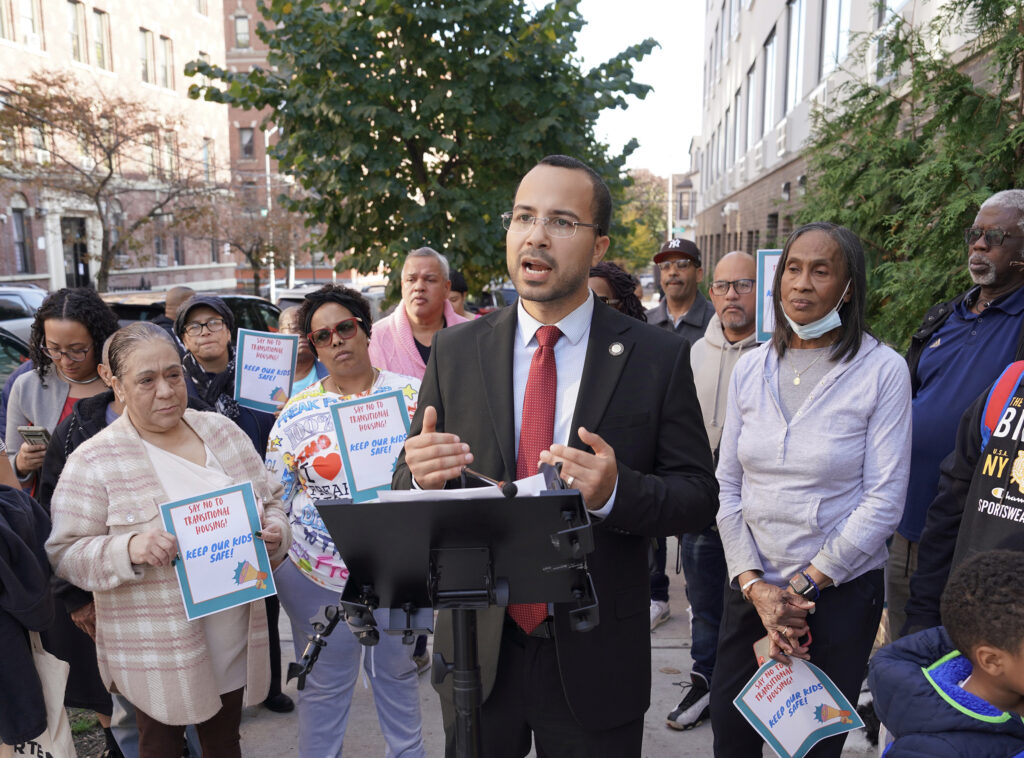
Photo courtesy of the Office of Oswald Feliz
Editor’s Note: The following is an extended version of the story that appears in our latest print edition.
City Council Member Oswald Feliz (C.D. 15), Assemblyman George Alvarez (A.D. 78), Congressman Adriano Espaillat (NY-13) and Bronx Borough President Vanessa Gibson are backing a chorus of voices who oppose the opening of a new, 83-bed, emergency and transitional housing development for men in Fordham Manor, operated by The Fortune Society.
In a prior letter dated April 30 to New York City Mayor Eric Adams, Feliz, Alvarez, Espaillat and Gibson laid out the reasons why they believe the proposed location at 2586 Bainbridge Avenue is not suitable. Stating at that time that they had recently become aware of the planned development aimed at assisting very needy populations with potential substance abuse challenges, they wrote, “We are writing to express our deep concern regarding this proposal and to urgently request its immediate halt, followed by an emergency meeting to discuss the matter in detail.”
They said the local community [in Bronx Community District 7 and City Council District 15] had consistently voiced concerns regarding the oversaturation of facilities like homeless shelters and substance abuse centers in its district. When Norwood News previously requested a breakdown from the Adams administration of the number of shelters and supportive housing projects in The Bronx compared to other boroughs, we did not receive it.
“The Fordham Road community in the Bronx serves as a prime example, where rather than receiving essential resources and community centers, it continues to face the influx of new social services programs solely,” the letter continued. The elected officials said they were disheartened that instead of alleviating the burden in what they said was an already strained community, the Adams administration was considering further exacerbating the issue with the proposal. “Placing it steps away from an existing homeless shelter in one of the city’s most impoverished zip codes only compounds the challenges our community already faces,” they wrote.
They continued, “Furthermore, it is deeply troubling that our community was not formally notified or given the opportunity to participate in the planning process, which should be afforded to all communities.” They said it was imperative that all communities have a voice in decisions directly impacting them. “Continuously concentrating these services in the same few neighborhoods within New York City is not conducive to sound policy, and we cannot afford to overlook this issue any longer,” they wrote.
“We respectfully urge you to halt the proposed plans immediately and convene an emergency meeting to engage in constructive dialogue on this matter,” they added. They implored and welcomed the mayor’s office to take “a proactive role” in the siting of such services to ensure “equitable distribution across all communities” and to foster collective efforts to address the challenges faced.
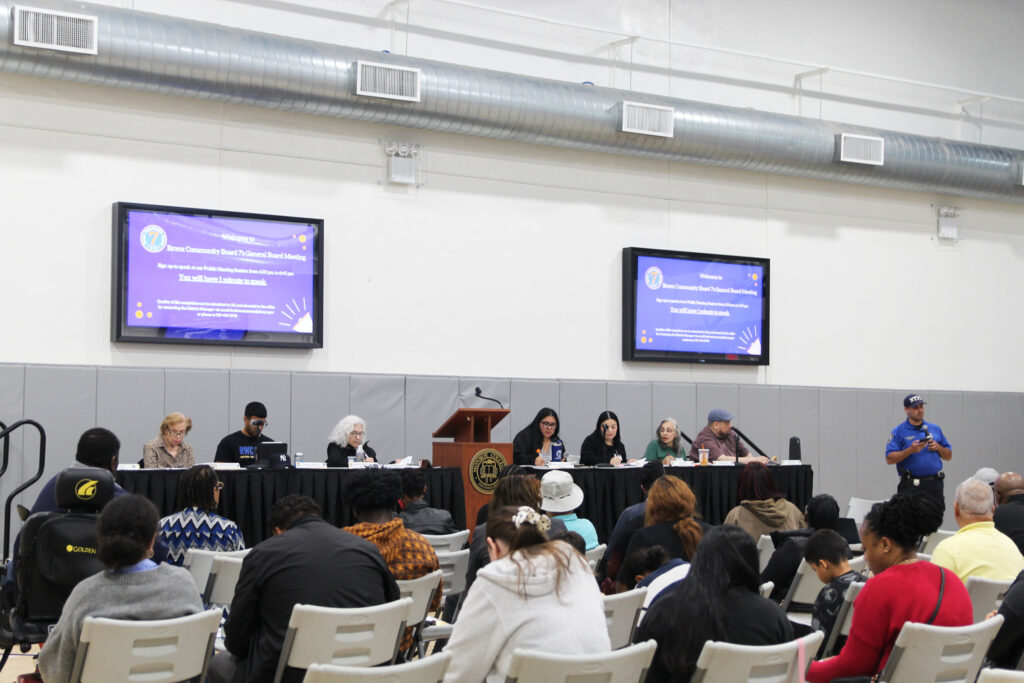
Photo by Síle Moloney
After receiving a letter dated Sept. 30 about the proposed development, the Bronx CB7 Housing, Land Use and Economic Development Committee discussed it at their Oct. 8 meeting, at which the Mayor’s Office of Criminal Justice (MOCJ) was unavailable to present, saying representatives would have someone present at the November meeting instead.
The committee voted to propose a motion to send a letter of opposition to the MOCJ and to The Fortune Society regarding the development. Members discussed how the area around the proposed site already had many quality-of-life issues including illegal dumping, drug use, and drug sales.
It was noted that the building was already constructed, though the board understood it was to be used for family housing. As confirmed at the Bronx CB7 executive meeting on Oct. 17, the motion passed. At the board’s general board meeting held on Oct. 22 in Fordham Manor’s Monroe College, several residents voiced their opposition to the project. Speaking in Spanish, Nancy Lucien said although she understood housing was a human right, as a woman and as a mother, she was scared.
“Recently, a 15-year-old girl was almost raped in the vicinity of the neighborhood, and I fear for my quality of life,” she said. The NYPD reported that on Sunday, Oct. 13, at around 1 a.m. in the vicinity of Webster Avenue and East Mosholu Parkway South, a 25-year-old female victim was approached by a man who sexually assaulted her. Lucien said she also runs a daycare and said the mothers of the children who attend the daycare had equally voiced their concerns about the development.
Another resident, Ms. Caraballo agreed with Lucien, saying, “We have four decades in that block, and right now we have several issues going on with derelicts, drug users, you name it.” She also referenced the sexual assault. “We are constantly fighting with people, with dumping and these derelicts.”
Caraballo continued, in part, saying, “They dump garbage in our community. We do not have help from the City because they keep saying it’s a private street. We pay people to clean the neighborhood. There are always constant needles on the street. We have kids in the neighborhood, especially with the daycare; they can’t play outside, and these homeless people, they’re always on the street. We have separate issues with them, so we are here today to oppose [the plan].
René Caraballo also spoke to those gathered, accompanied by three children who appeared to be under the age of 10. “It’s rare that you see kids coming to a general meeting like this; there’s a purpose,” he said. “The purpose is that they have concerns. We run a daycare also.”
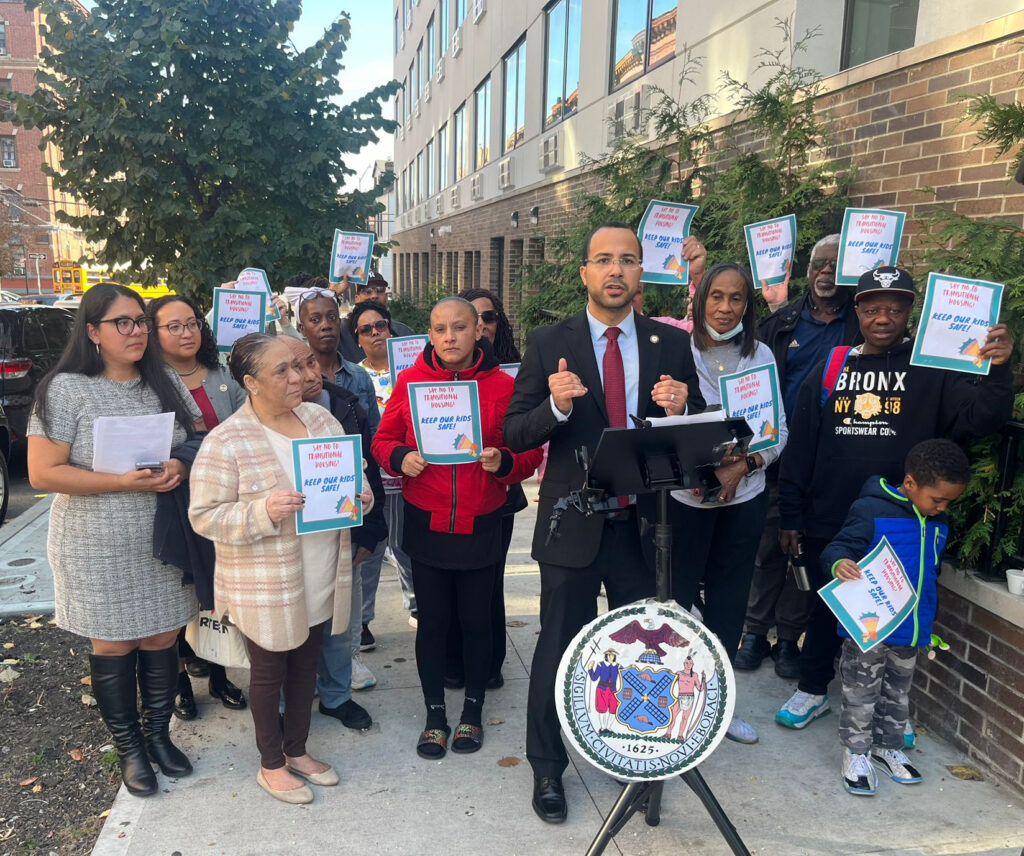
Photo courtesy of Bronx Community Board 7
He then asked the kids, “What do you see in the back of the house?” One of the kids responded, “Needles.” He then asked another, “And what do you see in the back of the house?” The child responded, “Criminals.” He asked the third child, “What do you see in the back of the house?” The third child replied, “Drug addicts.”
Caraballo added, “These are ideas that come not from me, from their heads.” He said the development was just going to bring another wave of crime. “We try to avoid them [the City] sneaking in another shelter like they did between Decatur [Avenue] and Marion [Avenue],” he said in part.
Speaking in Spanish, another resident, Augustín, who also runs a daycare, urged the mayor and The Fortune Society to reconsider the purpose of the building as he said it would affect the residents’ public safety and quality of life. Another resident, Betty, said she, too, had a daycare. “We have a lot of issues back there and in front of the house,” she said. “We have a private house, like six, seven, eight. We don’t want another shelter because right now, it’s a lot of people that are using drugs. They cause a lot of disaster there.”
Betty said her kids were very scared. “They don’t want to play at [Poe] Park because they [adults] smoke marijuana.” She also said she was not opposed to dogs, but she said a lot of people had dogs who pooped in the area and that kids were getting it on their shoes and clothes. “A lot of people smoke marijuana and use drugs there, and if they put another shelter over there, I think it’s gonna be very bad, and we don’t want this,” she said.
Speaking in Spanish, a female homeowner said she was tired of being bothered by people in her neighborhood, along with the trash and disorder she also frequently witnessed. Cristian Ramos from the Kingsbridge Merchants Association also spoke, saying he represented more than 200 businesses in the area and called for more to be done to address public safety and quality of life between dedicated meetings on those topics. “As a merchant business owner, our corridor is in danger,” he said.
He alleged Sen. Gustavo Rivera (S.D. 33) informed him there was nothing that could be done about the drugs and needles in the area. Ramos said people should think about the next generation growing up. “I’m disappointed they say that we can’t go arresting these people,” Ramos said in part.
Representing the senator, who had been present during the earlier part of the meeting, Rachel Ferrari later thanked Bronx CB7 and the residents for their feedback, and said it was helpful to hold agencies and organizations who deal with various drug-related issues in the area accountable. She added that Rivera represented about 320,000 people, and that they needed to be heard.
Another Fordham Road area resident complained about noise in front of a church every Saturday and a food truck on Creston Avenue in front of Citibank which she alleged didn’t respect parking regulations and she questioned if it was selling food at a discounted rate that may not be refrigerated.
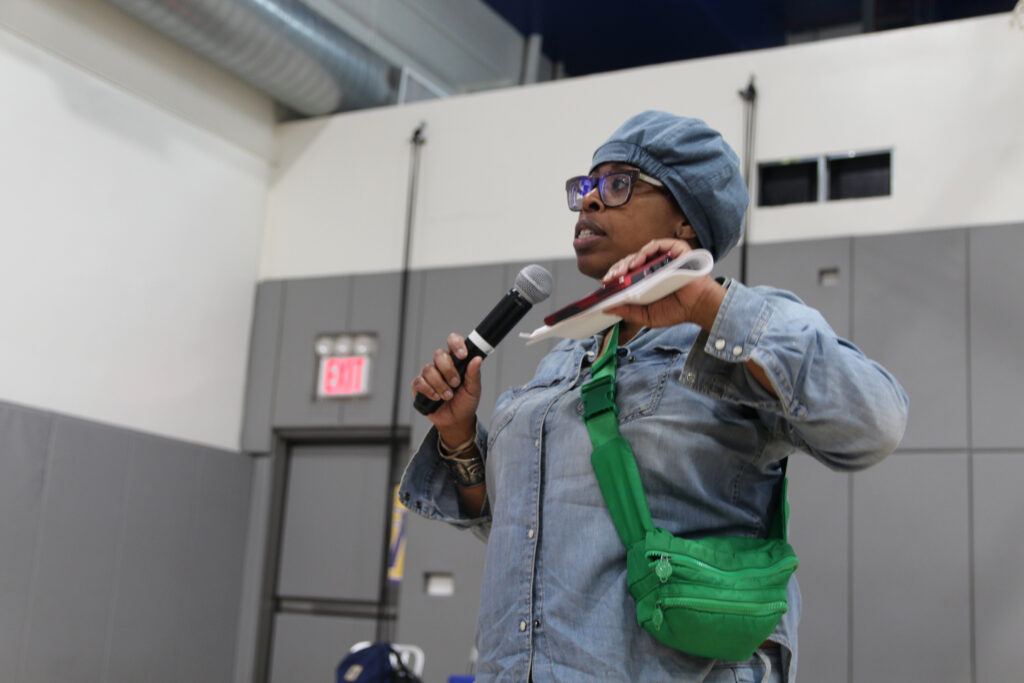
Photo by Síle Mloloney
On Wednesday, Oct. 30, residents and merchants holding signs reading in part, “Keep our Kids Safe” joined Feliz, and Karla Cabrera Carrera, district manager for Bronx CB7, at a rally at 2586 Bainbridge Avenue to once again oppose the project. The assemblyman was also present ahead of the rally but had to depart before it got underway.
Norwood News reached out to the Mayor’s Office to ask if it had responded to the April letter sent by the Bronx elected officials and if the requested emergency meeting was ever been held. A spokesperson for MOCJ replied saying a response was sent by Deanna Logan, director for the MOCJ, to the councilman on Aug. 19, a copy of which Norwood News has received.
It referred to the mayor’s commitment to keeping New York City the safest big city in the country, that Fordham Road was “deeply important to the Administration,” and that the latter “was committed to the neighborhood’s continued progress.” It continued in part, “Housing is an essential building block of safety for New Yorkers. Ensuring that people with criminal justice history have the appropriate resources [including housing] to reintegrate to their communities is a key component of our shared overall goal of safe neighborhoods for all New Yorkers.”
Logan said transitional housing was part of that effort, adding that finding somewhere to live under the best of circumstances was already difficult, let alone for the formerly incarcerated. “To facilitate public safety outcomes, MOCJ works with non-profit partners to find appropriate locations to provide temporary housing to individuals released from jail or prison.”
In choosing 2586 Bainbridge Avenue for the development, the size, layout and proximity to goods, services, including transportation were cited as factors offering the best foundation to support the formerly incarcerated reintegrate to the community. Logan confirmed that The Fortune Society was the chosen provider for the site. “Fortune has a strong track record of meeting participant needs while acting as a positive force and good neighbor in local communities,” she said. “We are confident that they will continue their practice at this location.”
A spokesperson for MOCJ also shared the following comments with Norwood News on the project, writing, “While this site is currently under review, this proposal reflects our commitment to delivering on shared goals of addressing homelessness and recidivism. At this site, we’re aiming to fill a gap in the transition from housing instability to permanent housing for those impacted by the criminal justice system.”
As this seemed to conflict with Logan’s letter that The Fortune Society was already the site’s chosen provider, we asked for further clarification. The MOCJ spokesperson later clarified that while The Fortune Society has been chosen as the provider, Bainbridge Avenue site “is under review as we receive feedback and continue to engage with community leaders about the plans here.”
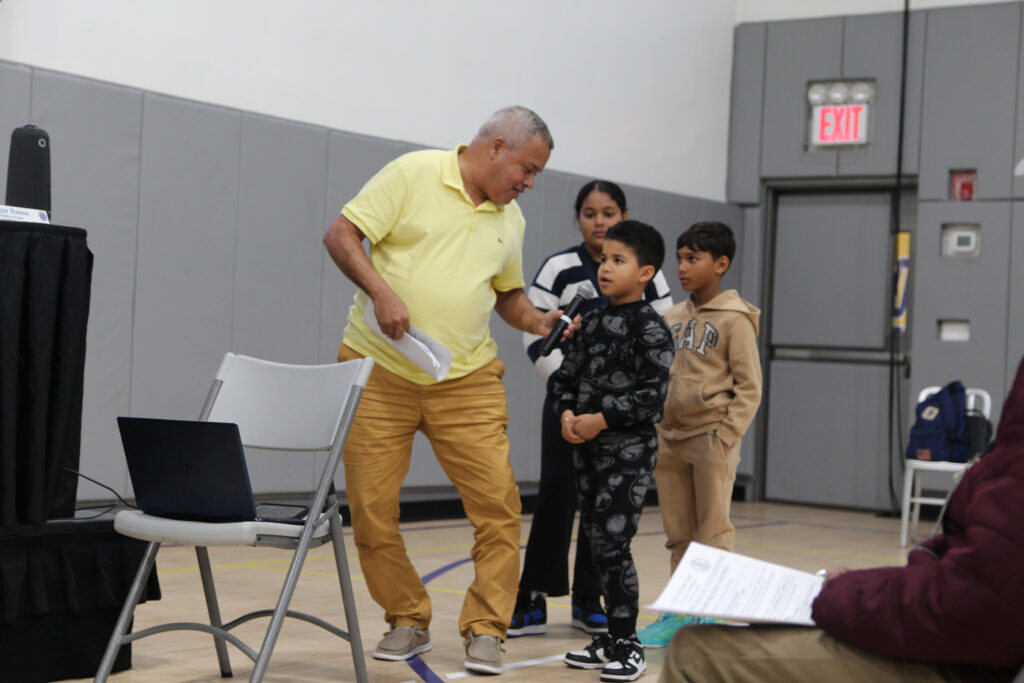
Photo by Síle Moloney
The MOCJ spokesperson continued, “After conducting a citywide search for available and appropriate sites, this location offers the best foundation for formerly incarcerated New Yorkers hoping to re-enter society. The Mayor’s Office of Criminal Justice has proposed to work with the Fortune Society, whose proven track record working with the formerly incarcerated speaks for itself. We are committed to continuing to engage with community leaders on any questions they have about this project so together we can deliver on our shared goal of creating safe neighborhoods for all New Yorkers.”
The spokesperson provided further specifics on the development as follows:
- The MOCJ proposed to contract with The Fortune Society to operate 83 beds of emergency and transitional housing at 2586 Bainbridge Avenue. Each unit will have a kitchen, bathroom, and one or two bedrooms, each furnished with a bed and dresser.
- This is part of MOCJ’s emergency and transitional housing program, which aims to safely reduce its incarcerated population, prevent repeated justice system contacts for those released from incarceration, and provide stable housing to those who would otherwise need to rely on the city’s shelter system.
- Residents at 2586 Bainbridge Avenue will be adults, aged 18 and older, who identify as male, and are justice-involved, experiencing homelessness, and at high risk for further justice system involvement without housing or supportive services, or require housing post-release to support stabilization in community.
- Transitional housing like the plans proposed for this site provide housing with an array of services and supports that will fill a much-needed gap in the transition from housing instability to permanent housing for those impacted by the criminal justice system.
On the selection of the Bainbridge Avenue site, MOCJ said it considered the need for housing in the community for those impacted by the criminal justice system, the compatibility of the site with facilities in the immediate and surrounding neighborhood, the concentration of similar facilities, consistency with existing plans to prevent homelessness, the efficient and cost effective delivery of services, and the potential effects on the neighborhood.
They said that MOCJ conducted a citywide search for available and appropriate sites, but due to the scarcity of available space suitable for emergency and transitional housing, no viable alternative sites were identified or proposed. They said that due to the size and layout of the 2586 Bainbridge building, as well as the site’s proximity to essential goods and services — including transportation, youth programs, community gardens, public libraries, educational facilities, and religious institutions — the location offered the best foundation for formerly incarcerated New Yorkers returning to the community.
On the topic of community engagement, the MOCJ spokesperson said it had discussed the proposed use of the site with Bronx CB7 and Feliz and remained available to meet with community representatives if there were any questions regarding the site. Cabrera Carrera said Bronx CB7 first became aware of the project when they received a letter about it in September and understood it was designated for families, not adult men. We’ve asked MOCJ for comment on this point and will share any feedback we receive.
The MOCJ spokesperson also said that City Hall staff has been in touch with Feliz about the project frequently over the last year. The spokesperson went on to say that the site was consistent with the city’s efforts to address the needs of the community for the following reasons:
-
- Bronx CB7 identified affordable housing as the community’s greatest need.
- Fortune’s operation of this site and the city’s plan to address homelessness align with CB7’s FY23 Statement of Community District Needs, which stated that there is a need for the City to supply more affordable housing opportunities to accommodate households in different income brackets.
- The Bronx Borough President’s 2021 Strategic Policy Statement notes that many formerly homeless residents need active or passive support services in order to improve their lives.
- Additionally, the borough president committed to reducing recidivism in The Bronx, endorsing programs that assist people on probation to keep them from future criminal justice involvement.
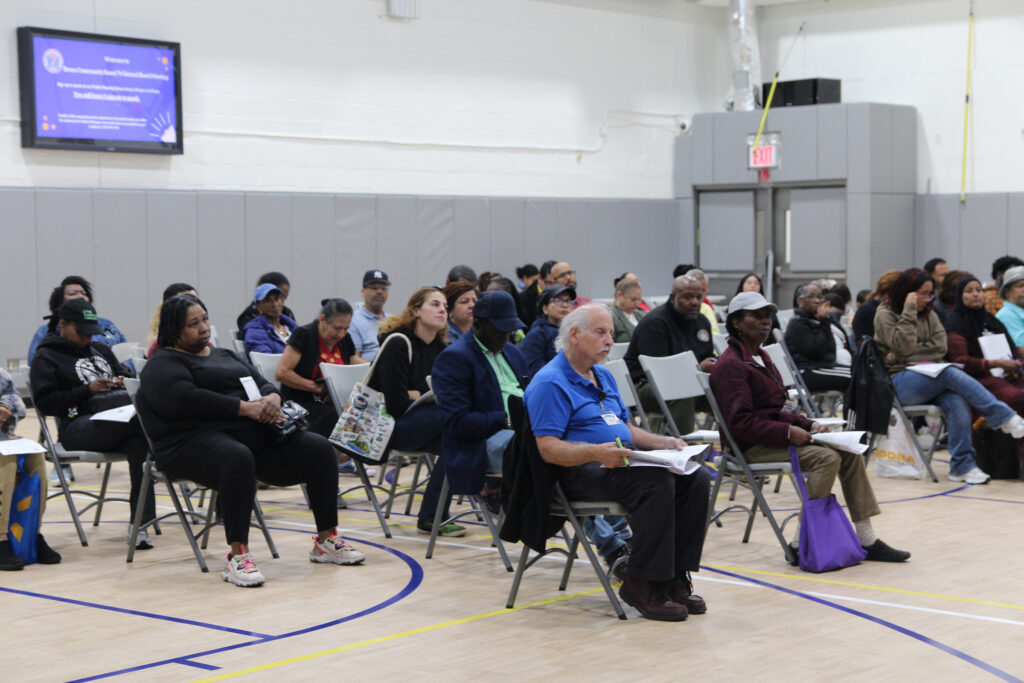
Photo by Síle Moloney
The borough president’s latest [2022] Strategic Policy Statement can be read here.
We asked The Fortune Society when they first discussed the project with the community and requested the project timeline. A spokesperson for the Society responded, saying, “Currently, The Fortune Society does not operate a housing residence at this location and does not have a signed lease or possession of the building. We have only had preliminary discussions with the Mayor’s Office of Criminal Justice (MOCJ) regarding the provision of housing services in this area; however, nothing has been finalized.”
This appeared to conflict with Logan’s letter where she confirmed The Fortune Society had been chosen as the provider. On this point, the MOCJ spokesperson later added, “There is a proposal but there is nothing final in place.”
The Fortune Society spokesperson recommended reaching out to MOCJ and the building’s landlord for more information and added, “Please note that The Fortune Society values community input and understands the importance of engaging with neighborhood residents and leaders. Should the project proceed, we remain committed to working closely with local stakeholders to ensure transparent communication and address any community concerns.”
The Fortune Society was also appointed the managing partner of the contentious Just Home project located on the grounds of Jacobi Hospital in Morris Park, as reported.
We reached out to the impacted elected officials for any further updates and will share any feedback we receive.
For more on this related topic, click here. Read some of our recent stories on housing affordability and availability in The Bronx here and here.
Council Member Rafael Salamanca (C.M. 17) had similar complaints about the number of shelters in his district as reported by News 12. Salamanca said in part, “We’re asking for equity! While some council districts [..] have no shelters, District 17 has over 60. My community has done MORE than its fair share; it’s time for the rest of the city to step up!”




